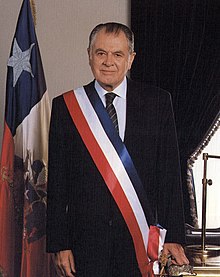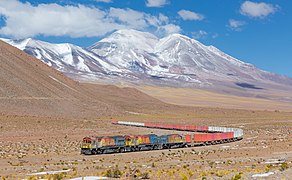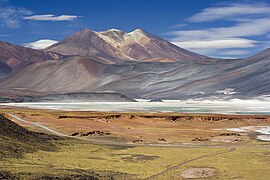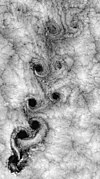Portal:Chile
| Main page | Assessment | Articles | Templates | Translation | Noticeboard | To Do List | Portal |
The Chile Portal

Chile, officially the Republic of Chile, is a country in western South America. It is the southernmost country in the world and the closest to Antarctica, stretching along a narrow strip of land between the Andes Mountains and the Pacific Ocean. Chile had a population of 17.5 million as of the latest census in 2017 and has a territorial area of 756,102 square kilometers (291,933 sq mi), sharing borders with Peru to the north, Bolivia to the northeast, Argentina to the east, and the Drake Passage to the south. The country also controls several Pacific islands, including Juan Fernández, Isla Salas y Gómez, Desventuradas, and Easter Island, and claims about 1,250,000 square kilometers (480,000 sq mi) of Antarctica as the Chilean Antarctic Territory. The capital and largest city of Chile is Santiago, and the national language is Spanish.
Spain conquered and colonized the region in the mid-16th century, replacing Inca rule, but failed to conquer the independent Mapuche people who inhabited what is now south-central Chile. Chile emerged as a relatively stable authoritarian republic in the 1830s after their 1818 declaration of independence from Spain. During the 19th century, Chile experienced significant economic and territorial growth, putting an end to Mapuche resistance in the 1880s and gaining its current northern territory in the War of the Pacific (1879–83) by defeating Peru and Bolivia. In the 20th century, up until the 1970s, Chile underwent a process of democratization and experienced rapid population growth and urbanization, while relying increasingly on exports from copper mining to support its economy. During the 1960s and 1970s, the country was marked by severe left-right political polarization and turmoil, which culminated in the 1973 Chilean coup d'état that overthrew Salvador Allende's democratically elected left-wing government. This was followed by a 16-year right-wing military dictatorship under Augusto Pinochet, which resulted in more than 3,000 deaths or disappearances. The regime ended in 1990, following a referendum in 1988, and was succeeded by a center-left coalition, which ruled until 2010.
Chile has a high-income economy and is one of the most economically and socially stable nations in South America, leading Latin America in competitiveness, per capita income, globalization, peace, and economic freedom. Chile also performs well in the region in terms of sustainability of the state and democratic development, and boasts the second lowest homicide rate in the Americas, following only Canada. Chile is a founding member of the United Nations, the Community of Latin American and Caribbean States (CELAC), and the Pacific Alliance, and joined the OECD in 2010. (Full article...)
Pichilemu (Mapudungun: Small forest, pronounced [pitʃiˈlemu] ), originally known as Pichilemo, is a beach resort city and commune in central Chile, and capital of Cardenal Caro Province in the O'Higgins Region. The commune comprises an urban centre and twenty-two villages, including Ciruelos, Cáhuil, and Cardonal de Panilonco. It is located southwest of Santiago. Pichilemu had over 13,000 residents as of 2012.
The Pichilemu area was long populated by the indigenous Promaucaes. European-Chilean development began in the mid-sixteenth century, as conquistador Pedro de Valdivia gave Juan Gómez de Almagro the Topocalma encomienda (which included the current territory of Pichilemu) in January 1541. Pichilemu was established as a subdelegation on 16 August 1867, and later as an "autonomous commune" on 22 December 1891, by decree of the President Jorge Montt and Interior Minister Manuel José Irarrázabal. Agustín Ross Edwards, a Chilean politician and member of the Ross Edwards family, planned to develop it as a beach resort on the Pacific Ocean for upper-class Chileans. (Full article...)Selected biography -
Patricio Aylwin Azócar OMCh (Latin American Spanish pronunciation: [paˈtɾisjo ˈelwin aˈsokaɾ] ; 26 November 1918 – 19 April 2016) was a Chilean politician from the Christian Democratic Party, lawyer, author, professor and former senator. He was the 30th president of Chile and the first president to be elected after the absolute rule of dictator Augusto Pinochet, and his election marked the Chilean transition to democracy in 1990.
Despite resistance from elements of the Chilean military and government after his election, Aylwin was staunch in his support for the Chilean National Commission for Truth and Reconciliation which exposed the systematic brutalities of the dictatorship. (Full article...)Selected article -
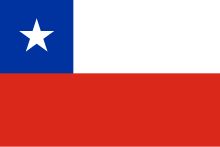
An authoritarian military dictatorship ruled Chile for seventeen years, between 11 September 1973 and 11 March 1990. The dictatorship was established after the democratically elected socialist government of Salvador Allende was overthrown in a coup d'état backed by the United States on 11 September 1973. During this time, the country was ruled by a military junta headed by General Augusto Pinochet. The military used the breakdown of democracy and the economic crisis that took place during Allende's presidency to justify its seizure of power. The dictatorship presented its mission as a "national reconstruction". The coup was the result of multiple forces, including pressure from conservative groups, certain political parties, union strikes and other domestic unrest, as well as international factors.
The regime was characterized by the systematic suppression of political parties and the persecution of dissidents to an extent unprecedented in the history of Chile. Overall, the regime left over 3,000 dead or missing, tortured tens of thousands of prisoners, and drove an estimated 200,000 Chileans into exile. The dictatorship's effects on Chilean political and economic life continue to be felt. Two years after its ascension, neoliberal economic reforms were implemented in sharp contrast to Allende's leftist policies. The government was advised by the Chicago Boys, a team of free-market economists educated in the United States. Later, in 1980, the regime replaced the 1925 Constitution with a new constitution in a controversial referendum. This established a series of provisions that would eventually lead to the 1988 Chilean national plebiscite on October 5 of that year. (Full article...)General images
Did you know (auto generated)

- ... that Salar de Pajonales in Chile has been used as an analogue for environments on Mars?
- ... that Salar de Pedernales in Chile features dark slope streaks resembling dark slope streaks on Mars?
- ... that Peruvian foreign minister Manuel María Gálvez Egúsquiza was arrested by Chilean troops for refusing to sign peace with the cession of territory during the War of the Pacific?
- ... that the Chile Ridge has a slab window?
- ... that Daniela Ceballos worked with the Football Federation of Chile to supervise safety protocols during the COVID-19 pandemic while playing football herself?
- ... that the Peruvian Civil Guard officer Mariano Santos Mateo was nicknamed the Brave Man of Tarapacá because he captured a banner of a Chilean military unit during the Battle of Tarapacá?
Topics
Categories
Recognized content
| This is a list of recognized content, updated weekly by JL-Bot (talk · contribs) (typically on Saturdays). There is no need to edit the list yourself. If an article is missing from the list, make sure it is tagged (e.g. {{WikiProject Chile}}) or categorized correctly and wait for the next update. See WP:RECOG for configuration options. |
Featured articles
- Chilean battleship Almirante Latorre
- Almirante Latorre-class battleship
- Cerro Azul (Chile volcano)
- Calabozos
- El Tatio
- Chilean cruiser Esmeralda (1883)
- Guallatiri
- Mount Hudson
- Laguna del Maule (volcano)
- Mothers of the Disappeared
- Ojos del Salado
- Pali-Aike volcanic field
- Pisco sour
- South American dreadnought race
- Taapaca
Good articles
- 2010 Pichilemu earthquakes
- 2018 Santiago ePrix
- Agustín Ross Cultural Centre
- Angata
- Los Ángeles Negros
- Apacheta-Aguilucho volcanic complex
- Argentine–Chilean naval arms race
- Atamu Tekena
- Orlando Bosch
- Lorenza Böttner
- Sara Braun
- Monte Burney
- Battle of Caldera Bay
- Felipe Camiroaga
- Chilean battleship Capitán Prat
- Carménère
- José María Caro Martínez
- Chile at the 2014 Winter Paralympics
- Coat of arms of Pichilemu
- Dutch expedition to Valdivia
- El Laco
- Milton Friedman
- Fueguino
- Irruputuncu
- Laguna Miscanti
- Laguna del Negro Francisco
- Lascar (volcano)
- Lastarria
- Lazufre
- Licancabur
- Licancabur Lake
- Llullaillaco
- Nevado de Longaví
- Manuel Foster Observatory
- Monturaqui
- Irene Morales
- John Thomas North
- Obligation to Negotiate Access to the Pacific Ocean
- Olca-Paruma
- USS Oneota (1864)
- La Pacana
- Parinacota (volcano)
- Patio 29
- Pichilemu
- Colegio de la Preciosa Sangre de Pichilemu
- Salar de Punta Negra
- Reclus (volcano)
- Murders of María José Reyes and Juan Duarte
- Sammis Reyes
- Riro Kāinga
- Sairecabur
- Salar Ignorado
- San Pedro (Chile volcano)
- Socompa
- Sollipulli
- Tacora
- Tilocálar
- Nevado Tres Cruces
- Tupungatito
- Tuyajto Lake
Featured pictures
-
360-degree Panorama of the Southern Sky edit
-
A 360 degree panorama of a unique cloudscape over La Silla
-
Culpeo MC
-
FCAB EMD GT22CU-3 San Pedro - Ascotan
-
Laguna Miñiques, Chile, 2016-02-08, DD 33-38 PAN
-
Laser Towards Milky Ways Centre
-
Miscanti Lagoon near San Pedro de Atacama Chile Luca Galuzzi 2006
-
Moai Rano raraku
-
SQM GE 289A Boxcab Carmelita - Reverso
-
Volcán San Pedro, Chile, 2016-02-09, DD 18
-
Vortex-street-1
WikiProjects
Related portals
New articles
Rules | Match log | Results page (for watching) | Last updated: 2024-05-26 19:55 (UTC)
Note: The list display can now be customized by each user. See List display personalization for details.
- Miss Cosmo International 2024 (edit | talk | history | links | watch | logs | tools) by KamyyFallon (talk · contribs · new pages (1)) started on 2024-05-25, score: 16
- Idea-Tec (edit | talk | history | links | watch | logs | tools) by Celinea33 (talk · contribs · new pages (1)) started on 2024-05-25, score: 31
- Alto Río building collapse (edit | talk | history | links | watch | logs | tools) by Toledo1970 (talk · contribs · new pages (2)) started on 2024-05-24, score: 28
- Job Bogmis (edit | talk | history | links | watch | logs | tools) by Das osmnezz (talk · contribs · new pages (65)) started on 2024-05-24, score: 35
- List of country subdivision flags in South America (edit | talk | history | links | watch | logs | tools) by For the nth time (talk · contribs · new pages (4)) started on 2024-05-23, score: 30
- 2019 WRC2 Championship (edit | talk | history | links | watch | logs | tools) by Rally Wonk (talk · contribs · new pages (38)) started on 2024-05-24, score: 14
- Sergio Hernán Pérez de Arce Arraigada (edit | talk | history | links | watch | logs | tools) by Ababil0811 (talk · contribs · new pages (3)) started on 2024-05-24, score: 18
- Simon of the Mountain (edit | talk | history | links | watch | logs | tools) by Οἶδα (talk · contribs · new pages (32)) started on 2024-05-24, score: 31
- Baile Funk Experience (edit | talk | history | links | watch | logs | tools) by Hyck (talk · contribs · new pages (2)) started on 2024-05-23, score: 14
- Catholic Church sexual abuse cases in Venezuela (edit | talk | history | links | watch | logs | tools) by Borboteo (talk · contribs · new pages (14)) started on 2024-05-23, score: 16
- Sixties Song (edit | talk | history | links | watch | logs | tools) by TabbyLadrona (talk · contribs · new pages (16)) started on 2024-05-22, score: 20
- David Pérez (footballer) (edit | talk | history | links | watch | logs | tools) by Das osmnezz (talk · contribs · new pages (65)) started on 2024-05-22, score: 15
- Lara Casas (edit | talk | history | links | watch | logs | tools) by Lachie23 (talk · contribs · new pages (3)) started on 2024-05-22, score: 20
- Leonora Vicuña (edit | talk | history | links | watch | logs | tools) by Nick Number (talk · contribs · new pages (20)) started on 2024-05-21, score: 63
- Matías Carrera (edit | talk | history | links | watch | logs | tools) by ImSnot (talk · contribs · new pages (7)) started on 2024-05-21, score: 23
- Atacamallium (edit | talk | history | links | watch | logs | tools) by Tom Radulovich (talk · contribs · new pages (130)) started on 2024-05-21, score: 67
- Teresa Lima (edit | talk | history | links | watch | logs | tools) by Lachie23 (talk · contribs · new pages (3)) started on 2024-05-21, score: 14
- Negationism of the military dictatorship of Chile (edit | talk | history | links | watch | logs | tools) by Borboteo (talk · contribs · new pages (14)) started on 2024-05-20, score: 43
- Dublin Declaration on Maternal Healthcare (edit | talk | history | links | watch | logs | tools) by Wikisaurus (talk · contribs · new pages (4)) started on 2024-05-20, score: 16
- Action of Rights Protection (Chile) (edit | talk | history | links | watch | logs | tools) by Xarucoponce (talk · contribs · new pages (1)) started on 2024-05-20, score: 53
- List of Academy Award–nominated films (edit | talk | history | links | watch | logs | tools) by Ostcgl (talk · contribs · new pages (1)) started on 2024-05-20, score: 16
- Patagona (edit | talk | history | links | watch | logs | tools) by UtherSRG (talk · contribs · new pages (39)) started on 2024-05-20, score: 16
- La Más Draga: Solo Las Más (edit | talk | history | links | watch | logs | tools) by Dominikcapuan (talk · contribs · new pages (1)) started on 2024-05-19, score: 14
- Gamochaeta alpina (edit | talk | history | links | watch | logs | tools) by Peter coxhead (talk · contribs · new pages (51)) started on 2024-05-19, score: 31
- Johannes Nuñez (edit | talk | history | links | watch | logs | tools) by ImSnot (talk · contribs · new pages (7)) started on 2024-05-18, score: 23
- Eunice pennata (edit | talk | history | links | watch | logs | tools) by PigeonJesus (talk · contribs · new pages (4)) started on 2024-05-18, score: 16
- History of Bologna FC 1909 (edit | talk | history | links | watch | logs | tools) by Manoru007 (talk · contribs · new pages (5)) started on 2024-05-17, score: 14
- The Idol (1952 film) (edit | talk | history | links | watch | logs | tools) by Lord Cornwallis (talk · contribs · new pages (45)) started on 2024-05-17, score: 43
- Confession at Dawn (edit | talk | history | links | watch | logs | tools) by Lord Cornwallis (talk · contribs · new pages (45)) started on 2024-05-17, score: 31
- Meganoticias (edit | talk | history | links | watch | logs | tools) by FrederickEvans (talk · contribs · new pages (30)) started on 2024-05-17, score: 43
- La torre de Mabel (edit | talk | history | links | watch | logs | tools) by FrederickEvans (talk · contribs · new pages (30)) started on 2024-05-17, score: 43
- Historic Centre of Cuzco (edit | talk | history | links | watch | logs | tools) by AlejandroFC (talk · contribs · new pages (12)) started on 2024-05-16, score: 14
- Montserrat Palmer (edit | talk | history | links | watch | logs | tools) by TomasVial (talk · contribs · new pages (2)) started on 2024-05-16, score: 49
- Marti Group (edit | talk | history | links | watch | logs | tools) by Fejesjoco (talk · contribs · new pages (1)) started on 2024-05-15, score: 16
- The Gelboys (edit | talk | history | links | watch | logs | tools) by Karich28 (talk · contribs · new pages (10)) started on 2024-05-15, score: 24
- Caroline Dawson (writer) (edit | talk | history | links | watch | logs | tools) by Bearcat (talk · contribs · new pages (142)) started on 2024-05-15, score: 35
- Carlos Díaz León (edit | talk | history | links | watch | logs | tools) by Tommy Boy (talk · contribs · new pages (1)) started on 2024-05-14, score: 43
- Astronomical Observatory University of Warsaw (edit | talk | history | links | watch | logs | tools) by Rpoleski (talk · contribs · new pages (0)) started on 2024-05-03, score: 16
- Juan Carlos Bertone (edit | talk | history | links | watch | logs | tools) by ImSnot (talk · contribs · new pages (7)) started on 2024-05-14, score: 31
- List of P1Harmony live performances (edit | talk | history | links | watch | logs | tools) by Takpods (talk · contribs · new pages (1)) started on 2024-05-14, score: 14
- Lissette García Bustamante (edit | talk | history | links | watch | logs | tools) by Old-AgedKid (talk · contribs · new pages (3)) started on 2024-05-13, score: 43
- Gastón Stang (edit | talk | history | links | watch | logs | tools) by Das osmnezz (talk · contribs · new pages (65)) started on 2024-05-13, score: 24
- Víctor Fuentes (Chilean footballer) (edit | talk | history | links | watch | logs | tools) by BrazilianDude70 (talk · contribs · new pages (35)) started on 2024-05-13, score: 63
- John Budinich (edit | talk | history | links | watch | logs | tools) by EssNS (talk · contribs · new pages (30)) started on 2024-05-12, score: 37
- Refinado Tom (edit | talk | history | links | watch | logs | tools) by TabbyLadrona (talk · contribs · new pages (16)) started on 2024-05-12, score: 16
- Juan Martínez Gutiérrez (edit | talk | history | links | watch | logs | tools) by TomasVial (talk · contribs · new pages (2)) started on 2024-05-12, score: 43
- Tomás Lerman (edit | talk | history | links | watch | logs | tools) by ImSnot (talk · contribs · new pages (7)) started on 2024-05-12, score: 35
- List of international trips made by Winston Peters as Foreign Minister (edit | talk | history | links | watch | logs | tools) by DougDommadome (talk · contribs · new pages (0)) started on 2024-05-04, score: 14
Associated Wikimedia
The following Wikimedia Foundation sister projects provide more on this subject:
-
Commons
Free media repository -
Wikibooks
Free textbooks and manuals -
Wikidata
Free knowledge base -
Wikinews
Free-content news -
Wikiquote
Collection of quotations -
Wikisource
Free-content library -
Wikiversity
Free learning tools -
Wikivoyage
Free travel guide -
Wiktionary
Dictionary and thesaurus


